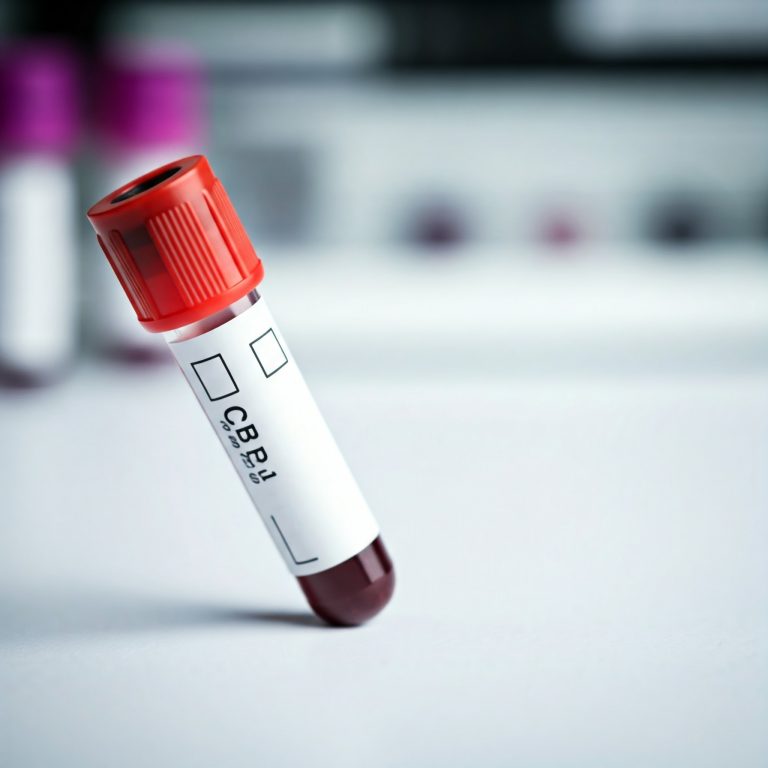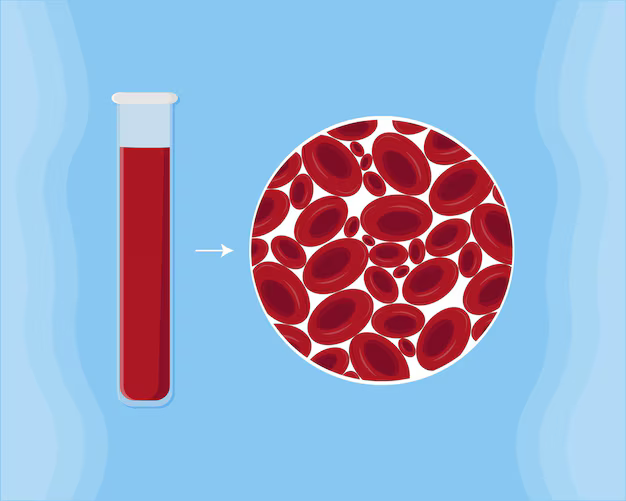Complete Blood Count (CBC): What It Is, and Benefits
January 09,2025

What Is Complete Blood Count (CBC) Test?
The Complete Blood Count (CBC) is a common medical test that examines the parts of blood to measure the status of general health and identify conditions. It quantifies key elements that include red blood cells (RBCs), white blood cells (WBCs), hemoglobin, hematocrit, and platelets.
RBCs indicate the oxygen carrying capacity, WBCs the functioning capacity of the immune system, and platelets are engaged in blood clotting. Diagnosis of anemia, infections, clotting disorders, some blood cancers, monitoring existing diseases, or the effectiveness of treatment procedures can be done by this very simple test-just the drawing of a small portion of blood.
Why Is The Complete Blood Count Test Done?
The Complete Blood test is conducted to assess health status and identify a range of conditions. It quantifies various constituents of blood, namely red blood cells (RBCs), white blood cells (WBCs), hemoglobin, hematocrit, and platelets.
A Complete blood test can help detect infections, anemia, inflammation, clotting disorders, immune system problems, and blood cancers. It gives vital information about the blood’s oxygen-carrying capacity, the body’s immune response, and the ability to form clots. Doctors may suggest a complete blood test while exploring symptoms like fatigue, weakness, fever, bruising, or bleeding. It is also used to monitor the effectiveness of treatments or track health conditions over time. This routine test provides an important diagnostic tool for identifying and managing health problems early on.
Can CBC Be Done at Home?
Performing a CBC test at home is becoming more feasible with advancements in technology. While traditional CBC tests require lab equipment, at-home kits are designed to provide quick insights into your health.
Benefits of CBC test at Home:
- Convenience: No need to visit a clinic or lab.
- Quick Process: Simple collection with fast results.
- Privacy: Perform the test in the comfort of your home.
How Will You Prepare For Your Complete Blood Count Test?
Preparation for a Complete Blood Test is simple and often doesn’t take much effort. Often, there is no special preparation required, and you are free to eat and drink normally. If the CBC is a component of a series of blood tests, you may be required to fast for some amount of time. It is essential to inform your healthcare provider about any medications, supplements, or underlying conditions, as these could affect the test results. Wear comfortable clothing with sleeves that can be rolled up for easy access to your arm. Arrive at the testing facility relaxed and hydrated, as this can make the blood draw smoother. Follow any specific instructions given by your doctor for accurate results.
However, some things to remember are:
- Fasting: Normally, fasting is not needed except if your doctor has ordered you to fast for other tests that will be done with the CBC.
- Medication Disclosure: You should tell your doctor about any medications, vitamins, or supplements that you are taking since these can sometimes affect the results.
- Hydration: Keep yourself hydrated to make the blood draw easier.
- Loose Wearing: Wear loose clothing to allow easy access to your arm for the blood draw.
CBC Test: What To Expect
A Complete Blood test is a simple and quick procedure to assess your general health. During the test, a healthcare provider will clean a small area of your arm, insert a sterile needle, and draw a small amount of blood into a vial.
CBC test procedure usually only takes a few minutes and can be somewhat painful or uncomfortable. Afterwards, the puncture site will be bandaged, and you will be able to get back to normal activities. A sample will then be sent to the laboratory for analysis. The findings are used to measure components of your blood, like red and white blood cells, hemoglobin, and platelets. A CBC blood test is the least invasive, and it is a must for diagnosing and treating many health conditions
The CBC blood test is a straightforward procedure that is usually conducted in a lab or a hospital:
1. Blood Draw: A healthcare professional will clean a small area on your arm, insert a sterile needle, and take a vial of blood.
2. Duration: The whole process only takes a few minutes.
3. Sensation: There might be a slight pinch when the needle enters and exits.
4. After the procedure: After the blood draw, a bandage is applied to the site and you can resume your daily activities
What Are Results & Normal CBC Count Range?
Haemogram test results give an idea of the healthiness of your blood by considering all the components.
Normal ranges may be slightly different in every laboratory but are generally in the following ranges:
– Red Blood Cells (RBCs): 4.7 to 6.1 million cells/\\u00b5L (for males), 4.2 to 5.4 million/\\u00b5L (for females).\
– White Blood Cells (WBCs): 4,500 to 11,000 cells/\\u00b5L.\
– Hemoglobin (Hgb): 13.8 to 17.2 g/dL (for males) 12.1 to 15.1 g/dL (for females).\
– Hematocrit (Hct): 40.7% to 50.3% for males, 36.1% to 44.3% for females.\
– Platelets: 150,000 to 450,000/\\u00b5L.\
– A normal C reactive protein test (CRP) result is less than 3 milligrams per liter (mg/L). This indicates that there is no inflammation in the body.
– Red cell distribution width blood test (RDW) is 11.5 – 14.5% for both men and women.
-The normal range for a mean corpuscular hemoglobin concentration (MCHC blood test) is typically between 32 and 36 grams per deciliter (g/dL)
-Average range for an Erythrocyte Sedimentation Rate (ESR test) depends on age and gender, and is as follows:
- Men under 50: 0–15 mm/hour
- Men 50 and older: 0–20 mm/hour
- Women under 50: 0–20 mm/hour
- Women 50 and older: 0–30 mm/hour
- Newborns: Under 2 mm/hour
- Children before puberty: 2–13 mm/hour
These values help diagnose conditions like anemia, infections, and clotting disorders. Abnormal results warrant further evaluation by your healthcare provider to identify underlying causes and necessary treatments.
How Soon Can I Expect to Receive the Results of my CBC Test
The results of a CBC blood test are typically available within 24 to 48 hours, depending on the laboratory\u2019s processing time. Results can be obtained in a few hours in urgent cases, such as during a visit to the hospital or in an emergency. The speed of obtaining results also depends on whether the test is done in-house or sent to an external lab. Once the results are ready, your healthcare provider will go through them and explain their implications to you. If the CBC blood work is part of a routine checkup, the results may be delivered during your follow-up appointment. For faster access, many labs now offer online patient portals to view your test outcomes directly.
What Do Abnormal CBC Results Mean?
Abnormal Complete Blood Count (CBC) results can indicate a variety of health conditions, depending on which blood components are outside the normal range.
For example:
- Low Red Blood Cell Count (Anemia): This might lead to fatigue, weakness, or shortness of breath and is often the result of nutrient deficiencies, chronic diseases, or blood loss.
- High Red Blood Cell Count (Polycythemia): May be associated with dehydration, lung disease, or heart conditions.
- Low White Blood Cell Count (Leukopenia): Makes patients prone to infections and might be indicative of bone marrow issues or autoimmune disorders.
- High White Blood Cell Count (Leukocytosis): Usually associated with infections, inflammation, or some types of cancer such as leukemia.
- Abnormal Levels of Platelets: May result in either a coagulation disorder or bleeding disorder. Your doctor will explain the findings and refer for additional diagnostic tests if required.
What Happens If Tests Are Abnormal?
If the CBC blood work comes back abnormal, your health provider will take you through a plan of what may have caused it and appropriate action to be taken. The actions may include;
- Discussing the Results: Your doctor will discuss with you the implication of abnormal values to your condition or history.
- Further Tests: Afterward, additional tests may be done such as blood smear, imaging, or some specific biochemical tests to know what caused the condition.
- Consult a Specialist: If the condition is serious, you might be asked to consult a haematologist or some other specialist.
- Monitoring: Follow-up cbc blood work are scheduled at regular intervals to monitor the progress over time.
- Treatment Plan: Your physician develops a treatment plan for the specific cause diagnosed.
Advantages Of Routine CBC testing:
- Early Detection: The abnormality can be diagnosed early, and treatment can start before complications arise.
- Health Maintenance: Monitoring blood components will enable proper management of chronic diseases.
- Peace of Mind: Knowing your blood health helps ensure that everything is fine with one’s overall health.
Conclusion
With its ability to evaluate key components of the blood, including red and white blood cells, hemoglobin, hematocrit, and platelets the CBC test provides invaluable information for early diagnosis and effective disease treatment.
Frequently Asked Questions (FAQ’s)
1. Does CBC need fasting?
A Complete Blood test typically does not require fasting. Unlike many other blood tests that measure levels of glucose or cholesterol, a CBC counts cells in your blood-the red blood cells, the white blood cells, and platelets. This is why consuming or drinking typically will not affect a CBC. Nonetheless, some may require fasting prior to those tests that often accompany the CBC, according to purpose. It is always recommended that you do what the health provider or laboratory conducting the test orders specifically for you for proper reporting.
2.What is the quantity of a CBC test?
Cost for a complete blood test: it depends upon the geographic location, healthcare facilities, and insurance coverage; however the price might be higher if additional tests or specific laboratory services are included. Some insurance plans may cover the full or partial cost of the CBC if it is deemed medically necessary. It’s best to contact your healthcare provider or lab for a more accurate estimate of the price. Some hospitals and clinics also offer package deals or discounts for routine tests like cbc blood work
3.Can I drink water before a CBC test?
Yes, it is safe to drink water before taking a CBC blood work, as this would not interfere with the result of the test. Drinking water keeps the veins full, which facilitates easier blood extraction from your arm by the phlebotomist. However, it is recommended to not take anything except water, especially sugary drinks or beverages containing caffeine as they can interfere with other blood tests if taken with a CBC. Always consult your doctor if you are not sure whether to drink water or if the CBC is performed along with other tests that may have certain fasting requirements.
4.What diseases can a CBC detect?
CBC blood work is a test that can detect many different medical problems, ranging from infections to anemia, leukemia, and clotting disorders, based on the presence of red blood cells, white blood cells, and platelets. The CBC will tell you whether you have an infection (an elevated white blood cell count) anemia (a low red blood cell count), or problems with blood clotting (abnormal platelet count). Although it is possible that a CBC might not always indicate such specific diseases, it does give precious clues to lead to further testing, so healthcare providers can better evaluate the patient’s overall health condition and, if present, diagnose.
5.What should I eat before CBC?
Generally, you do not need to make any special dietary adjustments before a CBC blood work because fasting is usually not recommended. However, if your doctor has told you to abstain or is conducting the CBC with other tests, then you should strictly follow his orders. In fact, having a balanced meal before the test can prevent weakness and dizziness, especially if you have low blood sugar. Avoid heavy meals or foods rich in fats just before the test, as they might impact other types of blood tests to be done along with the CBC.








Leave a Reply